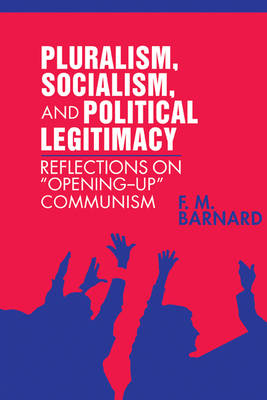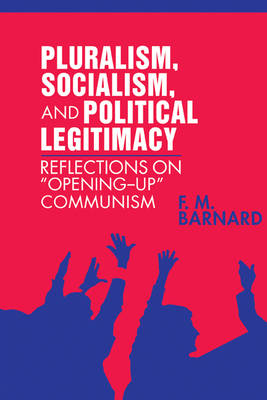
- Afhalen na 1 uur in een winkel met voorraad
- Gratis thuislevering in België vanaf € 30
- Ruim aanbod met 7 miljoen producten
- Afhalen na 1 uur in een winkel met voorraad
- Gratis thuislevering in België vanaf € 30
- Ruim aanbod met 7 miljoen producten
Zoeken
Pluralism, Socialism, and Political Legitimacy
Reflections on Opening Up Communism
Frederick M Barnard, F M Barnard
Hardcover | Engels
€ 175,95
+ 351 punten
Uitvoering
Omschrijving
The processes of transition from communist rule in Eastern Europe and the dilemmas of reform in the Soviet Union invite reflection on the role of pluralism in rendering a political system legitimate and democratic. In this book, Frederick M. Barnard examines differing conceptions of political pluralism, focusing on the question of how political differentiation can evolve and flourish without leading to crippling political fragmentation. The book uses certain proposals put forward by Czechoslovak reformers during the Prague Spring as a point of departure in examining broader questions about socialism and pluralism. These reformers outlined a unique form of pluralist socialism, and their arguments in favor of this political order take up a number of issues fundamental not only to the current reform process but to political theory generally. The ways in which these Czechoslovak proposals differed from others of the time put forward in Poland and Yugoslavia as well as from Western democratic theory are also discussed. Throughout the book, the author explores the ways in which the specific arguments of the Prague reformers illuminate the political-philosophical issues raised by socialist reform as well as the ways in which these issues themselves throw new light on Western political theory.
Specificaties
Betrokkenen
- Auteur(s):
- Uitgeverij:
Inhoud
- Aantal bladzijden:
- 204
- Taal:
- Engels
Eigenschappen
- Productcode (EAN):
- 9780521402521
- Verschijningsdatum:
- 26/06/1992
- Uitvoering:
- Hardcover
- Formaat:
- Genaaid
- Afmetingen:
- 159 mm x 236 mm
- Gewicht:
- 362 g

Alleen bij Standaard Boekhandel
+ 351 punten op je klantenkaart van Standaard Boekhandel
Beoordelingen
We publiceren alleen reviews die voldoen aan de voorwaarden voor reviews. Bekijk onze voorwaarden voor reviews.








